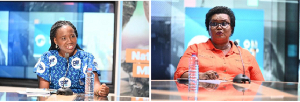Young female professionals in the maritime industry are encouraged to justify their inclusion by being competent, pursuing excellence, and adopting a ready-to-learn attitude toward their jobs.
This call comes on the back of increasing advocacy for more opportunities for women to participate in the historically male-dominated maritime industry.
Philippa Amanda Armah, the General Manager of Procurement at the Ghana Ports and Harbours Authority, and Pauline Abrokwah, Co-Chairperson for Tema District Technical Committee at GIFF, were the latest to make this appeal to aspiring female maritime professionals on the Eye on Port program, following the International Day for Women in Maritime celebration last weekend.
While the accomplished maritime professionals acknowledged the growing participation of women in the sector, they believe there is room for more, as women still do not make up a quarter of the industry's numbers. However, they implored that “women must bring something to the table when invited unto the table”.
They urged that women, on their climb to the top, must lead with competence and a work ethic that commands respect.
“When you are given the opportunity, don't just dwell on the fact that you are a woman. The door should not be opened for you just because you're a woman but because you have something to bring to the table. In any case, when the door is opened for you because you're a woman, when you come to the table it is about what you are bringing to the table that will sustain you at the table,” said Ms. Abrokwah.
“It's okay requesting an invitation to the table, but what are you bringing? And when you are given the opportunity to sit at the table are you able to maintain the seat at the table? Because just being ushered into the seat is one thing, but being able to maintain your seat at the table is also very critical,” Mrs. Armah added.
Phillipa Amanda Armah, who doubles as the President of the Port Ladies Association, urged aspiring female maritime professionals to be open-minded and embrace learning opportunities in the industry. She was emphatic about the need for these professionals to be widely read and adapt to the trends of the industry.
Besides academics, Pauline Abrokwah said women professionals should strive for hands-on practical knowledge of the industry they work in, avoiding the temptation to stay within the confines of their comfort zones. She stressed the need for women to take mentorship seriously as it would open them up to opportunities they did not know existed.
She urged fellow women to endeavor to join any of the recognized female associations, network proactively, and find suitable mentors who will help shape their career trajectories.
According to them, women's associations such as the Women’s International Shipping and Trading Association, Network for Professional Women in Maritime and Port Sectors of West and Central Africa, and Women in Maritime Africa, among a host of others, are crucial breeding grounds for gender advocacy, skills development, and leadership.
They said the fact that several different female groups have sprung up is indicative of an expansion of the cause for women and not a competitive venture.
On her part, the General Manager of Procurement at GPHA said presently, the focus of these female associations has been promoting awareness of the industry to the youth so they can garner interest for increased participation.
They expressed excitement about the expansion of women's participation in some of the technical fields of the sector, including the operation of heavy-lift equipment such as forklifts, cranes, tugboats, and more.
They called for a conducive environment that would encourage women to work more comfortably in these “hard” fields.
The accomplished maritime professionals were adamant that females, when given the opportunity and environment to thrive, could display their talent and competencies.
Business News of Monday, 27 May 2024
Source: Eye on Port
Female maritime professionals urged to lead with positive work ethic and learning attitude
 Pauline Abrokwah, Co-Chairperson, Tema District Technical/Phillipa Amanda Armah GM, Procurement GPHA
Pauline Abrokwah, Co-Chairperson, Tema District Technical/Phillipa Amanda Armah GM, Procurement GPHA
















